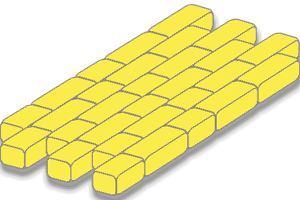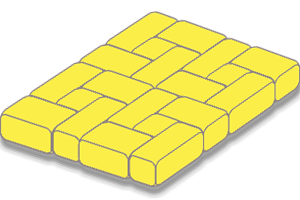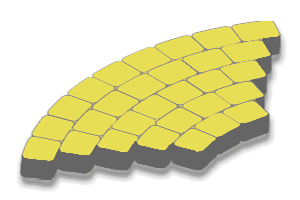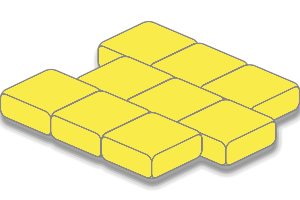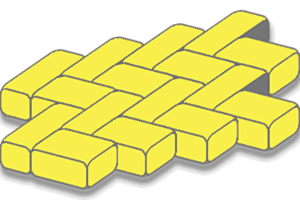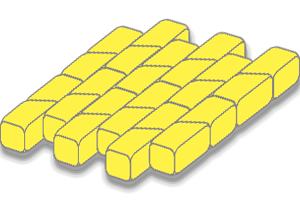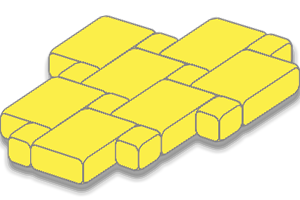Menu
close
Thousands of people across the UK have upgraded and improved their property by installing a new driveway, and this trend is sure to continue in the future.
Not only does a new driveway enhance the house it leads to, but it also adds something to the whole neighbourhood. Broken and neglected driveways in Ferryhill dotted with weeds and ruts can give an impression of neglect, increasing the likelihood of unwanted attention from criminal elements and vandalism.
Traditionally, your driveway options were limited to gravel, tarmac, or concrete. These generally worked very well, for a while. They didn't always look that great, but they did the job. The trouble is that they crumbled and cracked easily, and gravel can easily become scattered, especially in smaller spaces in a residential setting. Some tarmac driveways sunk in places, and old concrete ones became stained or broken because they couldn't take the weight of the cars parked on them.
Admittedly, in many cases, this was because they were poorly laid by disreputable or unqualified workers, or were DIY projects. But on the whole, concrete driveways just looked drab and unappealing.
In more recent years in Ferryhill, block paving (using individual bricks) and resin bound/bonded driveways have become extremely popular, and it's easy to see why. They provide an attractive finish, they are extremely durable and hard-wearing, and they are excellent value-for-money.
One option that some homeowners might shy away from is a concrete driveway. Going on past experience, this is understandable, but times have changed. The materials and methods used in the production and installation have improved dramatically, resulting in the introduction of pattern imprinted concrete driveways in Ferryhill that look amazing and last for years.
If you're not familiar with this fairly new innovation, then read on to discover more.
Also known as stamped concrete, this is a revolutionary method of creating spectacular-looking new driveways in Ferryhill. The concrete is mixed with fibres and sometimes resins are added for strength. This technology has been around for a while now but only seems to be getting more exposure in recent years.
To create the pattern imprinted driveway surface, wet concrete is poured onto a prepared sub-base after which colour is added, followed by a hardener. A pattern is then applied to the freshly poured concrete, using a selection of mats that create a wide range of different designs, patterns, and effects, such as cobblestones, slate, herringbone brickwork, random 'crazy paving', and even Ashlar stone.
There is a wide choice of colours to go with this, mostly based in the brown, red, buff, and black spectrum, although certain shades of blue and green can be achieved. On top of this, you can choose from a beautiful selection of edging options to complete your design.
This doesn't only have to be limited to driveways, as it makes an effective and attractive option for patios and paths, anywhere around your property where you need a hard surface.

Block paving and resin bound driveways have their obvious charms: they're relatively straightforward to install, depending on the complexity of the space; they allow for a wide range of colour options and designs that look absolutely stunning; they last for many years without the need for much maintenance, and they usually provide a permeable surface to allow rainwater to drain naturally.
These days, a concrete driveway can match this in almost every way.
In the past, cracking was a serious problem with any concrete driveway. The secret to preventing this in modern driveways is in the mixture used, as well as the preparation of the sub-base and the inclusion of crack control joints (see below for more details).
The sub-base provides an essential layer that adds structural strength and helps to spread the weight on any vehicles parked on top. If the base is too thin or paid unevenly, then the concrete may well fail.
It could be said that a pattern imprinted concrete driveway is only as good as the team that installs it and the quality of the materials used!
Finally, patterned concrete driveways require a minimum of maintenance, will stay weed-free for years, and won't sink or crack!
In general, a pattern imprinted concrete driveway compares very favourably with block paving, tarmac, and resin bound driveways. As always, costs will vary according to the stockist and product type.
The benefit of modern concrete driveways is that the average cost stays the same regardless of your chosen pattern or colour, unlike the block paving option. This means that you can design your driveway to suit your personal taste without having to worry about costs.
Many professional driveway companies advocate the pattern imprinted concrete driveway as being the best all-round solution.
As with most types, the cost will be per square metre. Obviously, larger areas will cost more, so if you include paths and patios in your project then the final bill will be higher.

It's difficult to say precisely, but there is no reason why a professionally installed pattern imprinted driveway shouldn't last for several decades.
You might come across reports that they only last between 4 and 10 years, or see nightmare stories of driveways that have crumbled and faded after a few months.
In the majority of cases, this is because the patterned concrete driveways have been laid by unscrupulous and unqualified companies who offer a cut-price service. This is always a mistake and will cost you far more in the long term.
However, there is possibly an element of truth in the figure of 4 to 10 years. It isn't that your imprinted concrete driveway will disintegrate in this time, more that the colour may seem to be fading. This is usually due to heavy use and UV rays from the sun.
In fact, the colour isn't actually fading. After installation, the team will apply a sealer that protects the concrete surface from damage as well as keeping the colours fresh. Over time, this can become scratched and worn, especially if the traffic is heavy.
This should be less apparent in areas around your patio as these areas will be subject to lighter use.
You can avoid this problem by applying a fresh coat of sealer every few years. It isn't expensive and will protect the surface for several years until you need to repeat the process once more.
One issue that concerns people is the possibility of cracks appearing. To counter this problem, the installation team will include crack control joints. These allow for any expansion during hot weather and contraction during the cold weather months. This constant shrinkage and growth are what causes concrete (and many other materials) to eventually crack, so by adding these joints the lifespan of the patterned concrete is improved significantly.

On average, the installation will be completed within 7 and 10 working days, from beginning any groundworks (sub-base installation), installing drainage, laying the concrete surface to your shape and design, right up to the final tidy up and inspection. Much of this depends on the weather, as concrete should not be laid if the outside temperature is too low or it is raining.
The installation process can be extremely messy, but a professional team will always minimise this and clean up after themselves, leaving your property neat and tidy.
A pattern imprinted concrete driveway should never be rushed. It requires patience and expertise, so it's best to leave the professionals to it and allow them to provide the very best finish.
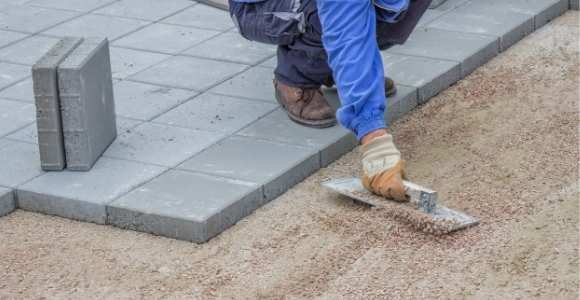
One issue you may come across is that local council building regulations may mean that you require planning permission for your new driveway.
Generally, recent legislation was changed to stipulate that any new driveway area that is smaller than five metres square and is permeable does not require planning permission. Pattern imprinted concrete is non-permeable, therefore it falls outside of this rule. This is one reason why potential customers choose resin bound driveways or a block paving option instead.
The reason behind this legislation is that many gardens have been converted into driveways over the years, resulting in millions of gallons of rainwater being diverted into local drains rather than seeping through the soil.
You may still be able to have your pattern imprinted concrete driveway installed, but you need to ensure that adequate drainage is included.
You should also check for any service pipes running beneath your driveway area, as the team will need to be aware of these to avoid any damage.

A pattern imprinted concrete driveway (or stamped concrete, whichever you prefer) is an excellent choice for your property.
It provides a stunning, cost-effective solution, transforming your home as well as adding value. You can easily increase the size of your project to include paths and a patio area, all tailored to your choice of colours, patterns and designs.
The installation process should be completed around a week, after which you won't have to worry about maintenance, weeds, or cracks. All you need to do is apply a coat of sealer every once in a while to keep your patterned concrete looking as fresh as the day it was laid.
Finally, to ensure the best possible results, only employ a reputable, professional, and trustworthy team of driveway specialists. You will have a perfect driveway that will last for many years to come, adding kerb appeal and possibly as much as 10% to the value of your house.
And that's an investment worth making.

